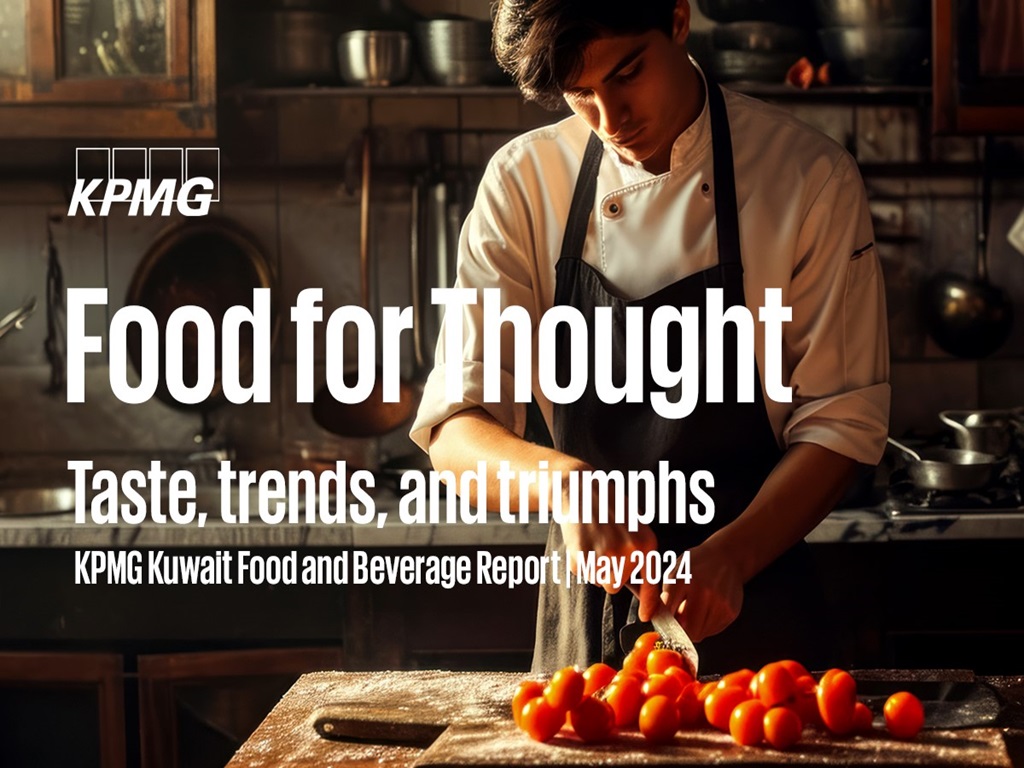A new survey by KPMG Kuwait, a multinational professional services network, on Kuwait’s food and beverage (F&B) industry revealed that consumers’ first preference was Lebanese food at 15.9%, Indian at 14.4% next, and following these, is the local food at 14.2%.
Kuwait’s love for food has shone through a diverse population, steep competition, and, more importantly, through the sands of time.
On the basis of the insights from more than 350 consumers, four industry leaders and one social media influencer, a country-specific report on the restaurant and cafés segment of Kuwait’s F&B sector was complied.
The report, titled Food for thought: Taste, trends, and triumphs, aims to reveal where Kuwait’s F&B sector is headed, the challenges that may arise, and the strategies that are being (need to be) pioneered for businesses in the industry to flourish.
Today, Kuwait is home to nearly 4.5 million people, catering to the eating habits of which is a network of more than 21,000 restaurants and cafés in the organised market.
And with the talks of food and beverages moving from diwaniyas to boardrooms, it is likely that the restaurants and cafés segment of the F&B industry could potentially be a hot plate to serve success on.
What’s apparent is surviving in this market takes more than gastronomic genius.
It discovers that Kuwait’s appetite for all things culinary is driven by a dynamic mix of cultures that demand an extra serving of newer, more diverse offerings from F&B businesses such as restaurants and cafés.
The consumers want Lebanese food (15.9%) first, Indian (14.4%) next, and local food (14.2%) after. The craving to try something different is becoming seemingly insatiable as more consumers want to feast on contemporary cuisines such as Italian, Chinese, and Japanese.
Thinking one step ahead are industry leaders, who unlike some business owners planning to diversify their menu, predict consumers to make a cyclic return to cuisine staples after a period of experimentation.
A love story that was already peaking, Kuwait’s affair with food is being propelled further to the top by the country’s increased mobile device penetration.
Consumers are increasingly relying on applications (73.9%) to order in food as well as to pay for it (43.1%).
While their older counterparts have not quite soaked their minds into the adoption of tech and are sticking to the more conventional route, F&B businesses are not falling behind.
They are leveraging technology to improve consumer experience, be it by developing newer and more unique recipes, reducing cooking and delivery times, or ensuring consistency in taste, among others.
Notably, the rise in online orders is giving dine-in destinations a reason to reconsider their offerings and cook up something that will encourage the eats-at-home consumer to dine-in.
But in all of this, one thing remains constant — the old love for personalised discounts and offers. The consumers (55.6%) still want them and expressed that such perks are what draw them to a restaurant or café and encourage them to return.
However, they agreed if their decision behind picking a restaurant/café was to be influenced, then a good word of mouth (28.5%) would do it best. The interesting thing here for F&B businesses to make note of is how they can leverage said initiatives to drive consumer satisfaction and build a strong connection with their customers.
As more modern restaurant and café chains look to enter, or cement their place, in Kuwait’s F&B market, they are somehow caught up in the shisha smoke. KPMG in Kuwait’s study found that 80% of the respondents smoke shisha, out of which 69.1% indulge in it 1–3 times every week.
Tapping into this opportunity pool will require businesses to relook at their offerings and understand how they can put tradition on the same shelf as sophistication.
One could assume coffee, like shisha, would have a far-reaching prevalence in Kuwait given the country’s voracious appetite for it. But that’s not case. The people want juice (21.8%) more than coffee (21.7%), albeit by a small margin.
Despite the small percentage of consumers with intolerances for lactose (8.5%) and gluten (4.2%), F&B businesses are happy to accommodate such needs in their day-to-offerings but do not see a distinct market emerge for plant-based and meatless products anytime soon.
Notably, a small niche of consumers who are subscribed (or want) to plant-based meal plans exists. But whether there will be any takers for them is going to be a factor of educating the consumers, bringing down the products’ prices, and taking a giant step away from Kuwait’s meat-heavy diet.
All in all, the F&B industry in Kuwait is witnessing a systemic drift led by consumers’ evolving preferences. On top of their demands is increased transparency, community engagement, and a piercing call for brand representatives to step into light and address their queries.
Ankul Aggarwal, Partner and Head of Deal Advisory, KPMG in Kuwait, said: “Kuwait’s F&B market is filled with a rich culinary heritage and a great potential for growth. Through this report, we wanted to gather the consumers’ views and opinions and investigate what F&B businesses, i.e., restaurants and cafés, in particular, require to thrive in the market, both, now and in the future.
“This research journey took us from working with emlyon business school, Paris, to hearing it firsthand from industry leaders in the restaurants and cafés segment. Through these collaborations, we discovered meaningful insights that can be turned into tangible opportunities.
“I am hopeful that the readers will have much to take away from our report and incorporate in their decision-making process.”
This report by KPMG in Kuwait was compiled in collaboration with emlyon business school, Paris, and featured qualitative interviews of Abdulaziz AlTuraiji, CEO, TABCo Food, Mubarak Jaffar, Co-Founder and CEO, KLC Virtual Restaurants, Mohammad Al-Mutairi, CEO, Aleid Foods, Khaled Naga, CEO — Restaurant Sector, Al Thiqa Food Group Company (TFGC), and Inspired Edibles, Kuwait. – TradeArabia News Service































